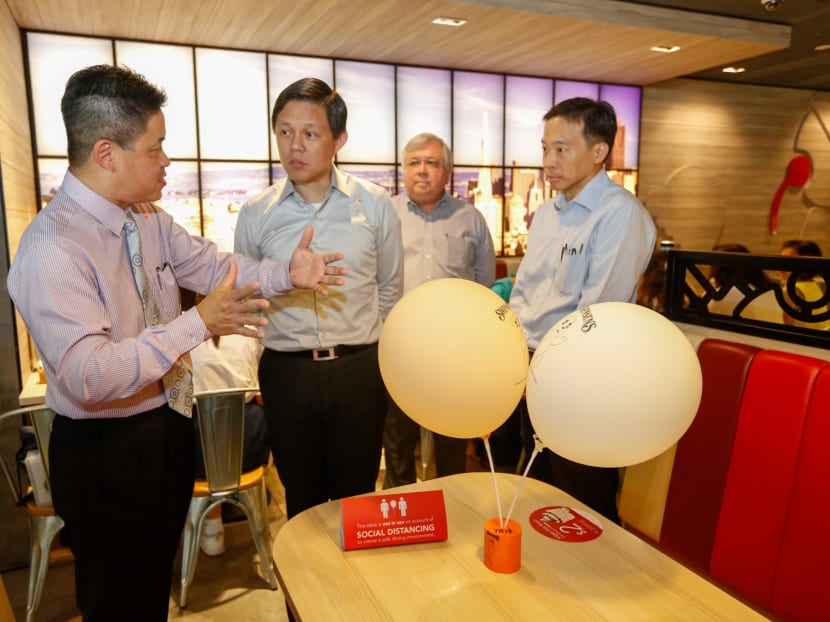S’pore face challenges in maintaining trade flow amid Covid-19 upheavals: Chan Chun Sing
SINGAPORE — The halt in production of goods in many countries as they go into lockdown during the Covid-19 pandemic, as well as disruptions to air and sea connectivity, are among the biggest challenges that Singapore is facing in maintaining its trade flow, Trade and Industry Minister Chan Chun Sing said.

Trade and Industry Minister Chan Chun Sing (second from left) at a visit to Swensens' restaurant in Bugis Junction mall on March 31, 2020.
SINGAPORE — The halt in production of goods in many countries as they go into lockdown during the Covid-19 pandemic, as well as disruptions to air and sea connectivity, are among the biggest challenges that Singapore is facing in maintaining its trade flow, Trade and Industry Minister Chan Chun Sing said.
Speaking to reporters after touring a Swensen’s restaurant on Tuesday (March 31), Mr Chan said some countries that have implemented a lockdown in a bid to curb the spread of the coronavirus did not fully consider its implications and “will soon find themselves short of critical components”, including in the manufacturing and food production chains.
To ensure that Singapore continues to have adequate supplies, Mr Chan said government agencies have to be quick to source for alternative supplies even before a lockdown is implemented.
Countries would also have to agree to maintain their flow of goods. For that to happen, Singapore needs to maintain its air and sea links with the rest of the world.
“Because it is not just about Singapore connecting with the rest of the world for our own supplies. Singapore as a regional hub also provides connectivity services for the rest of the region and the world,” Mr Chan said.
Despite having a nation-wide strategy in place to ensure Singapore’s food supplies, he noted that the Covid-19 crisis has thrown up unforeseen changes that have led the authorities to review how they diversify food sources and ensure enough stockpile.
For example, unlike previous crises, this one is global, which means that a greater number of supply lines would be cut.
“So today, when the economic agencies look at our stockpile numbers, we have to constantly keep watch — which are the countries that are approaching a possible lockdown or shutdown and make sure that we take anticipatory moves… for us to develop new sources,” he said.
He added that the time span the authorities need for planning has also become longer, as Singapore may encounter recurring waves of infection imported from other countries as they adopt different standards to curb the spread of the virus.
Given the dynamic global situation where there is news about a country or city putting up tighter controls every other day, Singaporeans must be mentally prepared for food prices to go up due to the constant disruptions in supply, Mr Chan said.
At the same time, Singapore and its people can take steps to ensure that food prices here are stable — that is, it only fluctuates within a certain range.
Singaporeans can be more open to other alternative food sources, as well as remain calm and not panic-buy. The country can also choose to diversify its food choices even when the situation is normal.
“We try our best to secure fresh supplies from as many countries, as many sources as possible. In the event (of) a temporary disruption, we must be prepared to use alternatives — be it frozen or canned (food) to tide us over before the supplies come back again,” he said.
ON RESILIENCE BUDGET
Mr Chan was also asked about the S$48 billion Resilience Budget, which was unveiled last week by Deputy Prime Minister Heng Swee Keat to help Singapore cope with the Covid-19 pandemic. The second stimulus package came just a month after the Budget statement was delivered by Mr Heng in February.
Mr Chan noted that the supplementary budget was designed to “give confidence” to the country.
“We have the depth of resources to meet the new challenges that may still be emerging. (The Resilience Budget) must also give people confidence that we have a government that knows exactly how to tackle the issues in a surgical way,” he said.
Beyond the size of the Resilience Budget that has grabbed headlines, Mr Chan said that people should focus on how it is targeted at businesses and workers most affected by the crisis, including the aviation, tourism, retail as well as food-and-beverage (F&B) sectors.
Last week, TODAY reported on how Covid-19 and the effect it has on businesses has brought the imbalance of power between landlords and tenants back into the limelight, and a committee under the Singapore Business Federation is reviewing the Fair Tenancy Framework with the aim of putting the guidelines into legislation.
Calls for landlords to reduce their rent have been reverberating over the past few weeks, as fears over the pandemic have sharply reduced consumer demand, leaving many retailers and F&B outlets struggling to survive.
On this issue, Mr Chan reiterated that both parties need to find a way to build a “sustainable, long-term relationship”.
“Our advice to both sides, the tenant side and the landlord side, is that both sides must see each other as a long-term partner. Both sides cannot take a short-term perspective in this. The spirit must be that, ‘In good times, we share the benefits. In tough times we share the pain',” he said.











